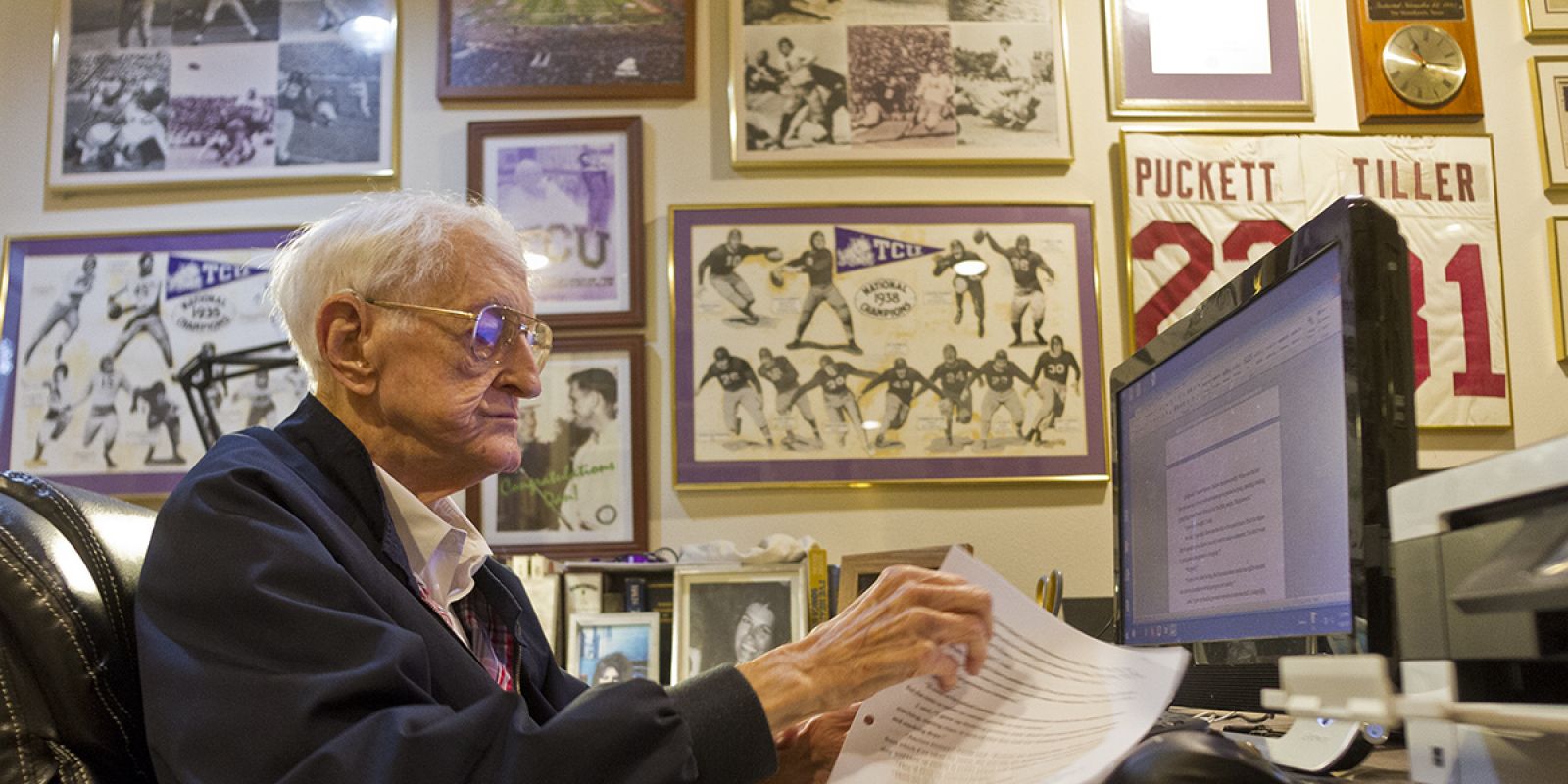
Dan Jenkins Is a TCU Treasure
The award-winning sports writer made his name writing for Sports Illustrated and Golf Digest, and his books include Semi-Tough, which became a movie.
As a candid chronicler of college football and professional golf, Dan Jenkins ’53 has spent more than a half-century in the national spotlight for his award-winning sports reporting, best-selling novels and, of late, zesty tweets.
The Fort Worth native has amassed many honors as well, including the unveiling in May 2017 of the Dan Jenkins Press Box at Amon G. Carter Stadium. The inaugural Dan Jenkins Medal for Excellence in Sportswriting was awarded in October 2017.
And though Jenkins turned 88 in early December, the prolific writer insists he has no intention of retiring anytime soon. “I can’t not work on something,” Jenkins said.
A senior writer with Golf Digest since 1985, Jenkins has penned a dozen novels, including Semi-Tough (Atheneum, 1972), a football satire that became a 1977 film starring Burt Reynolds. Jenkins is working on his 11th volume of nonfiction at the home he shares with June, his wife of nearly six decades.
“Dan is a treasure for TCU and for Fort Worth,” said Mark Cohen, associate athletics director for communications, who lobbied for the football stadium press box to carry Jenkins’ name. “When you talk about sports writers, he’s on the Mount Rushmore. Dan is an absolute legend.”
Early Cowtown Years

Dan and June Jenkins celebrate the awards given in his name in October 2017. They have been married nearly 60 years. Photo by Mark Graham
Doting family members and an array of opportunities defined Jenkins’ early years in Fort Worth. “As an only child, I was spoiled rotten, could do no wrong, was given anything I asked for,” he recalled. “I tried to repay my loving family by earning a college degree and becoming self-supporting as soon as possible.”
Jenkins gravitated to sports due in part to his network of relatives, including the grandparents he lived with following his parents’ divorce. While attending TCU football games in elementary school, he marveled as Davey O’Brien ’39 and Samuel “Slingin’ Sammy” Baugh ’37 dominated the gridiron.
In 1941, Jenkins spent a week at Colonial Country Club watching the National Open (later renamed the U.S. Open). That experience sparked in the 11-year-old a lifelong love affair with the game.
Upon graduating from R.L. Paschal High School in 1948, Jenkins reported for the Fort Worth Press and has continued writing on deadline ever since.
Between his work at the daily newspaper and studying English and journalism at TCU, Jenkins also managed to find time for the college golf team. He was captain from 1950 to 1952. “I didn’t consider myself an athlete, just a decent local amateur golfer,” Jenkins said.
During the 1950 Southwest Conference Championship in golf, the top-ranked Jenkins vied against Morris Williams Jr., who, like Jenkins, was a future Texas Golf Hall of Famer.
Jenkins narrowly lost the round but not before piquing the interest of golf legend Ben Hogan, who already had won nine majors. Hogan abandoned his own game that day to witness the epic collegiate contest. Jenkins would later count the golfing great as a friend.
“It was my good fortune to have Ben Hogan to cover,” Jenkins said. “I knew him better than any other writer and played golf at the Colonial with him 30 or more times throughout his peak years, the ’50s.”
The Big Apple Calls
After rising through the ranks at the Dallas Times Herald, Jenkins decamped to Sports Illustrated in 1963. His tenure at the magazine would exceed two decades, with his stock rising alongside the publication’s.
“The ’60s, ’70s and ’80s were a swell time to be at SI,” Jenkins said. “It was a great calling card then, opened doors quickly.”
Jenkins traveled nonstop, logged relentless hours at his typewriter and forged friendships with the top writers of the day, including George Plimpton, Gore Vidal, Truman Capote, Norman Mailer and Liz Smith, the late gossip columnist who was another Fort Worth transplant. Many evenings, the scribes shut down Elaine’s, the late, great watering hole on Manhattan’s Upper East Side.

Sally Jenkins followed in her father’s footsteps in journalism and is a sports columnist for The Washington Post. She co-chaired the Dan Jenkins Medal awards held in October 2017. Photo by Mark Graham
Even though each of the three Jenkins children was born in Fort Worth, Sally, Marty and Danny grew up in Manhattan. The family lived in a 12-room duplex on Park Avenue, along with maintaining homes in Hawaii and Florida. The children attended private schools. (Stanford-educated Sally Jenkins became a sports columnist for The Washington Post. She also co-chaired the Dan Jenkins Medal awards, helping assemble a jury composed of 16 of the top writers and editors from across the country.)
Jenkins wrote more than 500 stories for Sports Illustrated — a record number of bylines — before moving to Golf Digest in 1985. He continues to write short- and long-form pieces for the magazine.
During the majors and the Ryder Cup, Jenkins dominates Golf Digest’s Twitter feed. “I took to tweeting right off,” he said. “I love to comment on the spur of the moment, but the best thing is, you can say things that would never make it into a story because it wouldn’t fit the theme.”
Jenkins also has enjoyed chronicling the rise of the current crop of golf competitors, 20-something players including Jordan Spieth, Rory McIlroy, Justin Thomas and Rickie Fowler. “Tiger [Woods] was a rock star, but if you examine his career, he had fairly weak competition — so sue me,” Jenkins said. “I really like this new breed.”
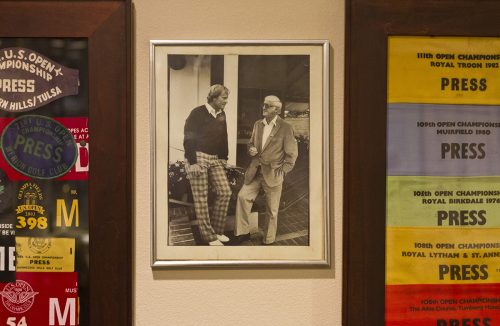
A photo of Dan Jenkins with golfer Jack Nicklaus hangs among the press passes in Jenkins’ home office. Photo by Mark Graham
In terms of public awareness of professional golf, Jenkins helped shape the way Americans have come to view the four majors: the Masters Tournament, the U.S. Open, the Open Championship (British Open) and the PGA Championship.
“Dan wasn’t the first person to call them majors, but he was largely responsible for popularizing the idea that those four golf tournaments are much more important than any others and that the way you would evaluate a golfer’s historical legacy was primarily — if not exclusively — by how they did at those tournaments,” said Michael MacCambridge, an author and a jury co-chair for the Dan Jenkins Medal. “His work changed the public perception of the importance of those particular tournaments, and that’s not celebrated or mentioned enough.”
Jenkins, however, continues to receive recognition for his impressive body of work. In 2012, he became one of only three writers inducted into the World Golf Hall of Fame. The following year, he received the prestigious Associated Press Sports Editors Red Smith Award, bestowed for contributions to sports journalism.
“Dan Jenkins has had immeasurable impact on sports, his field and on TCU,” Cohen said. “It’s been fitting, appropriate and wonderful watching him honored for everything he has done.”
Lasting Legacy
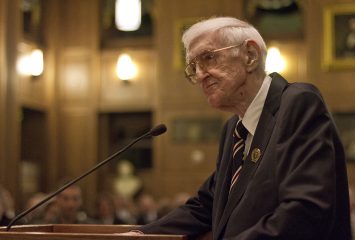
Dan Jenkins speaks to the crowd at the inaugural awards given in his honor in October 2017. Frank DeFord, a colleague of Jenkins at Sports Illustrated, posthumously received the first lifetime achievement medal. Photo by Mark Graham
When it comes to college football, the Jenkins legacy includes helping popularize the idea of a national championship.
“I will always be a college football junkie, no matter how much they try to ruin it,” said Jenkins, who was named official historian of the National Football Foundation in 2005. Four years later, he received the organization’s award for Outstanding Contribution to Amateur Football. “But I’m going to hate the Bowl Championship Series until TCU wins it.”
Dan is a treasure for TCU and for Fort Worth. When you talk about sports writers, he’s on the Mount Rushmore. Dan is an absolute legend.
Mark Cohen, associate athletics director for communications
That unapologetic passion for Horned Frog football — plus the fact that after moving back to Fort Worth, he and his wife would become Gary Patterson’s neighbors — led to an abiding friendship between the writer and the football coach.
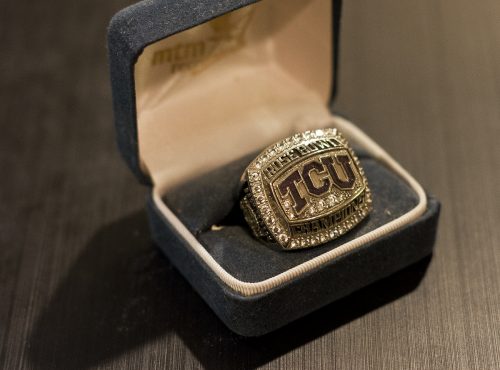
The ring TCU presented to Dan Jenkins after the TCU football team won the Rose Bowl Championship. Photo by Mark Graham
The relationship even survived a memorable lunch at Colonial Country Club following the 2004 season. “What I love about Dan is that you know where you stand with him,” Patterson said. “We walked into the club for lunch and the whole place knew I had gone 5 and 6 that season. Dan gave me a butt-chewing right there, but it’s rare to have someone tell you exactly how it is, and it’s something I value.”
Added Jenkins: “I was just frustrated because we’d been to six straight bowl games after all the pitiful years, and we were on a roll. Then we lost to a team we should have run out of the stadium, and the streak ended. I hope he’s forgiven me, but I don’t apologize for saying I didn’t know how much longer I could buy tickets to watch our short-side option juggernaut.”
Alongside Cohen and TCU Board of Trustees member Hunter Enis ’59 (’63 MA), who played collegiate and professional football, Patterson was an early proponent of naming the TCU Press Box for Jenkins. “I’m beyond flattered and truly grateful to those who made it happen,” Jenkins said. “After all, they could have sold it to Taco Bell.”
Jenkins’ wit, frankness and insightfulness, both in person and on the page, was one reason the Texas Program in Sports and Media at the University of Texas at Austin’s Moody College of Communication sought to honor the legendary writer.
Each fall, a peer jury will award the Dan Jenkins Medal in two categories: lifetime achievement in sportswriting and the most outstanding work of sportswriting published in the previous calendar year.
The inaugural awards dinner honorary co-chairs included Enis, partner and president of Four Sevens Oil Co.; Jerry Jones, owner of the Dallas Cowboys; Kathy Whitworth, who holds the record for the most wins in professional golf; and Tom Hicks, former owner of the Dallas Stars and the Texas Rangers. The ceremony was in mid-October at Old Parkland in Dallas.
Frank DeFord, Jenkins’ longtime colleague at Sports Illustrated, was posthumously awarded the lifetime achievement recognition. DeFord’s widow, Carol, and two children accepted the honor.
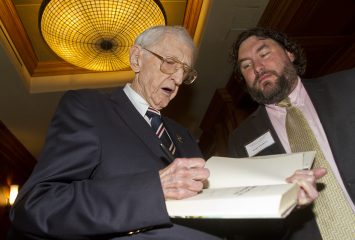
Dan Jenkins signs a copy of one of his books for Wright Thompson, senior writer for ESPN The Magazine, before the Dan Jenkins Medal event in Dallas. Thompson received an award for best sportswriting of 2016 for a profile on U.S. golfer Tiger Woods. Photo by Mark Graham
Wright Thompson, senior writer with ESPN The Magazine, was honored for the best sportswriting of 2016 for his profile of Tiger Woods. During his acceptance speech, Thompson described Jenkins as a legend whose work inspired him throughout his childhood in Mississippi.
“It’s almost hard to imagine that Dan Jenkins is, in fact, a real person,” Thompson said several weeks later. “It’s like Led Zeppelin. Sure, they’re virtuoso musicians, but come on, they’re also Led Zeppelin!”
As one of ESPN’s most acclaimed writers, Thompson is no stranger to winning awards but confesses he rarely picks them up in person because of his work schedule. (“ESPN knows just to send them to my mother,” he said.)
Thompson, however, cleared his calendar for the Dan Jenkins Medal. “For almost nobody else am I flying to Dallas — and flying my family to Dallas — for this kind of honor, but when you’re invited by the Jenkins family, you show up,” he said.
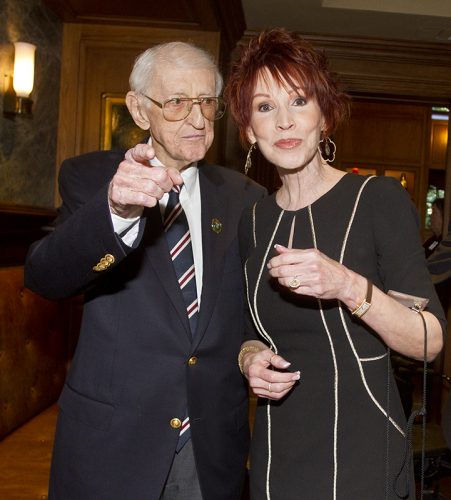
Dan Jenkins welcomes friend Sandra Brown, known for her best-selling novels and thrillers. “He’s really a national treasure,” she said. Photo by Mark Graham
Organizers of the October ceremony commissioned a 20-minute film about Jenkins’ life and storied career that included a TV clip from an appearance on The Tonight Show Starring Johnny Carson as well as insights from fellow well-known sports journalists such as Bob Costas.
The ceremony’s attendees included writer Roy Blount Jr. and best-selling novelist Sandra Brown, who befriended Jenkins and his wife about a dozen years ago and has sat with him during football games. “Dan’s mind is so sharp,” Brown said. “He’s really a national treasure.”
Following the film, an emotional Sally Jenkins stood with her father at the podium and showed him the circular medal emblazoned with his likeness that the winners received. “This state has writers,” she told the crowd. “And there’s not a greater writer in this state than my father.”
At the end of the evening and after thanking those who had gathered, Dan Jenkins offered up a bit of introspection about his legendary career: “Writing is what I like to do, and I’m going to do it until I drop.”
Narratives and Nonfiction:
The works of Dan Jenkins at a glance
by Lisa Martin
In seven decades as a professional writer, Dan Jenkins has published 12 novels and is working on his 11th book-length volume of nonfiction.
“It’s a collection which of course is perfectly hilarious,” Jenkins quipped.
His readers might lobby for Semi-Tough (Atheneum, 1972), hailed by some as the best football novel ever written, as the most beloved work in the Jenkins oeuvre. The novel’s narrative follows the antics of professional running back Billy Clyde Puckett and his wide-receiver roommate, Shake Tiller. In reviewing the book for The New York Times, David Halberstam wrote: “I loved it. … It mocks contemporary American mores; it mocks Madison Avenue; it mocks racial attitudes; it mocks writers like me; it even mocks sports writers for Sports Illustrated like Dan Jenkins.”
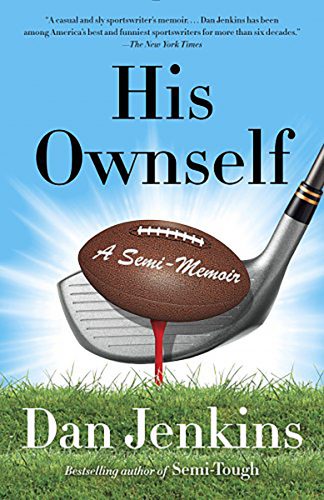 Semi-Tough attracted Hollywood’s attention. Five years after hitting bookshelves, the movie version by the same name starred Burt Reynolds, Kris Kristofferson and Jill Clayburgh.
Semi-Tough attracted Hollywood’s attention. Five years after hitting bookshelves, the movie version by the same name starred Burt Reynolds, Kris Kristofferson and Jill Clayburgh.
“The only thing Hollywood is good for is the money,” Jenkins said.
Nonetheless, Jenkins sold two other novels for screen adaptation. Unlike Semi-Tough, however, Jenkins penned the screenplays for both.
In 1988, HBO turned Baja Oklahoma (Atheneum, 1981) into a film starring Lesley Ann Warren and Peter Coyote. Later that year, the cable network aired a movie adaptation of Dead Solid Perfect (Atheneum, 1974), starring Randy Quaid as a struggling professional golfer.
Jenkins’ sequel to Semi-Tough arrived in 1984. Life Its Ownself: The Semi-Tougher Adventures of Billy Clyde Puckett and Them (Simon & Schuster) saw its hero embarking upon a career in TV broadcasting. College football, meanwhile, was central to Stick a Fork in Me (Tyrus Books), Jenkins’ most recent novel, which was released in January 2017.
The writer’s other nonfiction books include the decidedly politically incorrect BubbaTalks: Of Life, Love, Sex, Whiskey, Politics, Movies, Food, Foreigners, Teenagers, Football and Other Matters That Occasionally Concern Human Beings (Anchor, 1993).
Two decades later, Jenkins’ distinctive crankiness enlivened the pages of His Ownself: A Semi-Memoir (Doubleday, 2014), which takes readers from his childhood in Fort Worth to the Tiger Woods years.
Jenkins also wrote the book on TCU football with 2008’s Texas Christian University Football Vault, from Whitman Publishing. Two years later, Knopf published Jenkins at the Majors: Sixty Years of the World’s Best Golf Writing, from Hogan to Tiger, further cementing the writer’s status as America’s leading authority on the game.
As for which novels or nonfiction works have a special grip on his heart, Jenkins answered with his trademark dry wit. “The last book I finished,” he said, “is always my favorite.”

Your comments are welcome
2 Comments
Related reading:
TCU Dedicates Dan Jenkins Press Box
Press box named in honor of alumnus and longtime sports writer Dan Jenkins ’53.
Sports: Riff Ram
First Person: author Dan Jenkins ’53
Our resident sports nut and historian Dan Jenkins ‘53 remembers 1938 better than last week’s fried chicken. That title year – and a lot more – is all in his new TCU Football Vault, which he essentially wrote for free.
Features
Mac Engel Knows Football is Bigger in Texas
The sports writer’s ultimate road trip records the sights, sounds and smells of the Lone Star State’s legendary football culture.